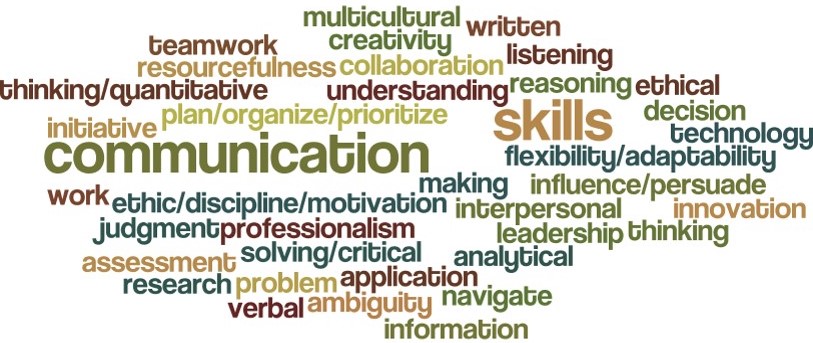
More than ever, students are seeking value from their educational experiences. With the rising costs of higher education, it’s natural to wonder if a degree is worth the investment. Degrees with unclear career outcomes are especially under a microscope; students want evidence of how universities are preparing them for life after graduation.
DePaul’s Transferable Skills Initiative (TSI) addresses these concerns. Spearheaded by the Career Center, a department within Enrollment Management and Marketing (EMM), TSI’s goal is to help students connect the skills they’re gaining while at DePaul to the ones they’ll need to navigate life after DePaul. Karyn McCoy, director of employer and college relations in the Career Center, has been at the forefront of TSI since it began in 2014.
“Feedback from faculty and employers highlighted the fact that students are developing a significant set of skills, but are struggling to identify and articulate those skills,” explains McCoy, who works to build relationships with employers who recruit DePaul students. “And that’s what TSI is trying to change. We’re trying to help students view their educational experience through a different lens.”
This effort started when the Career Center’s University Internship Program (UIP) piloted its two-credit course, “Uncovering Your Skills,” in the spring of 2014. Focusing on how academic studies and campus experiences transfer to the workplace, the course teaches students how to articulate their relevant skills to potential employers.
But the UIP course is limited in its reach. While 230 students have taken the course since the pilot year, the Career Center is addressing the issue on a larger scale to make a significant impact by partnering with other units at the university and developing a strategic approach to doing so.
The Transferable Skills MatrixIn 2015-16, after extensive research, McCoy and her team developed the Transferable Skills Matrix, a comprehensive list of employers’ most in-demand skills, organized into 5 categories: universal, analytical, creativity and communication, leadership and teamwork, and technical and information.
“We know that students are gaining transferable skills both inside and outside of the classroom,” says McCoy, “The task now is to use the skills matrix to help students better identify and articulate the connections between what they’re learning, the skills they’re gaining and the skills that employers are seeking.”
Building Student AwarenessSince the development of the skills matrix, the Career Center has partnered with the following areas to bring TSI to students:
- Academic: Because the liberal arts and social sciences have been the primary focus of public and political rhetoric around the value of a degree, TSI is being piloted in 8 departments within the College of Liberal Arts and Social Sciences and 2 in the College of Communication. Faculty in these programs are matching their course learning outcomes to skills from the Transferable Skills Matrix.
- Co-curricular: Student Affairs provides a wide range of experiential and co-curricular learning opportunities to students, so the Career Center is looking to pilot TSI in a select number of departments that coordinate these on- and off-campus activities.
- Student Employment: In Aug. 2016, TSI was integrated into the
Campus Job Board. When a hiring manager posts a position for a student employee, they are now required to select the top skills that students will have the opportunity to develop while in that position.
As TSI continues to grow and gain traction within the university, the Career Center hopes to advance students’ understanding and appreciation of the value of their educational experiences. DePaul already prepares students to be competitive applicants in the job market; TSI is helping illuminate the various ways that happens. At the heart of TSI’s mission is helping students connect their skills to future employment and career opportunities—regardless of their major.
For additional information about the Transferable Skills Initiative, contact
Karyn McCoy, director of employer and college relations within the Career Center.